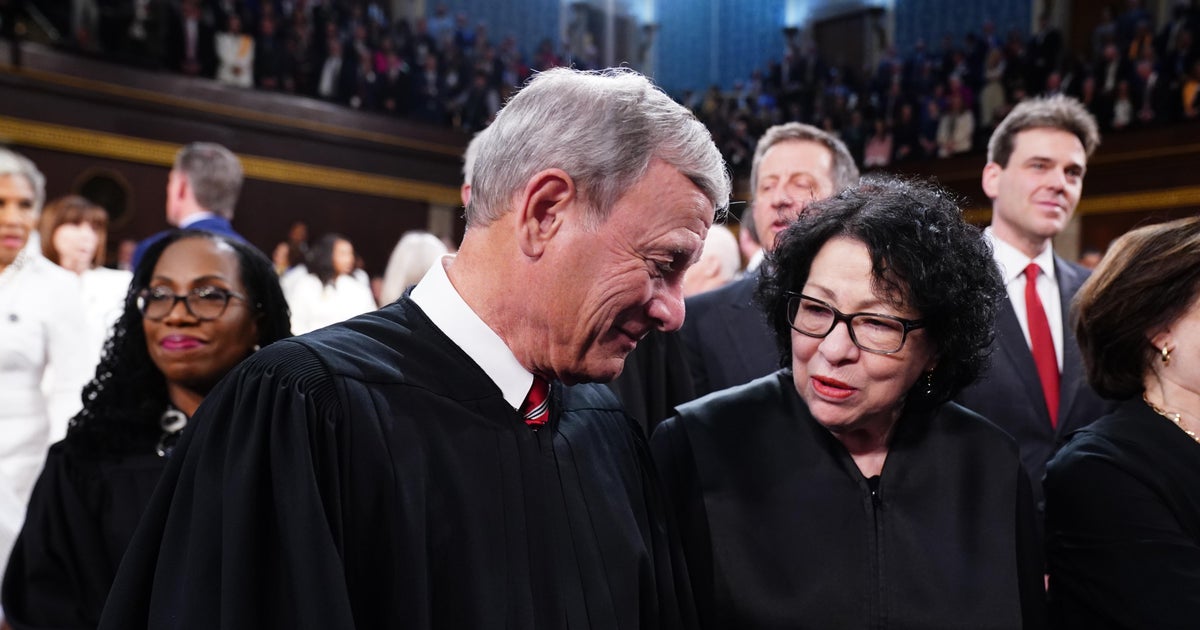CBS News
2 Russian soldiers who massacred Ukrainian family of 9 sentenced to life in prison

A Russian court sentenced two soldiers to life in prison for the massacre of a family of nine people in their home in occupied Ukraine, state media reported on Friday.
Russian prosecutors said in October 2023, the two Russian soldiers, Anton Sopov and Stanislav Rau, entered the home of the Kapkanets family in the city of Volnovakha with guns equipped with silencers.
They then shot all nine family members who lived there, including two children aged 5 and 9.
The southern district military court in Rostov-on-Don sentenced the two men to life in prison for mass murder “motivated by political, ideological, racial, national or religious hatred,” the state-run TASS news agency reported, citing an unnamed law enforcement source.
The incident triggered uproar in Ukraine.
Kyiv alleged at the time that the Russian soldiers had murdered the family in their sleep after they refused to move out of their home to allow Russian soldiers to live there.
“The occupiers killed the Kapkanets family, who were celebrating a birthday and refused to give up their home,” Ukraine’s human rights ombudsman Dmytro Lubinets said a day after the murder.
Russian forces seized the city of Volnovakha in Ukraine’s eastern Donetsk region at the start of their full-scale military offensive. Russian artillery strikes virtually destroyed it.
Stringer/Anadolu Agency via Getty Images
Russian soldiers have been accused of multiple instances of killing civilians in Ukrainian towns and cities they have occupied since February 2022.
Moscow has always denied targeting civilians and tried to claim reports of atrocities at places like Bucha were fake, despite widespread evidence from multiple independent sources. In 2022, independent journalists who went into Bucha found the streets littered with bodies. The dead were wearing civilian clothing, and some had their hands tied behind their backs, apparently executed. Others were buried in a mass grave.
The arrest and sentencing in this case is a rare example of Russia admitting to a crime committed by its troops in Ukraine.
State media did not say what prosecutors determined the reason for the attack was.
TASS suggested it could have been a “domestic dispute” while both the independent Radio Free Europe and Kommersant business outlets said it could have been linked to a dispute over obtaining vodka.
The trial was held in secret.
The independent Radio Free Europe outlet reported that Rau, 28, and Sopov, 21 were mercenaries for the Wagner paramilitary before joining Russia’s official army.
They had both received state awards a few months before the mass murder, it said.
Wagner mercenary chief Yevgeny Prigozhin and 9 crew members were killed last year when Prigozhin’s plane crashed between Moscow and Saint Petersburg, two months after he led a brief mutiny against Russia’s top military brass.
CBS News
Massive fires in both U.S coasts force evacuations, destroy homes

Watch CBS News
Be the first to know
Get browser notifications for breaking news, live events, and exclusive reporting.
CBS News
Despite pressure on Sotomayor, Supreme Court unlikely to change before Trump takes office. Here’s why.

Washington — President-elect Donald Trump’s victory Tuesday has stirred up whispers about whether Justice Sonia Sotomayor should step down from the Supreme Court to allow President Biden to nominate a successor before Republicans take control of Washington.
But any changes in the composition of the nation’s highest court are unlikely in the coming months, even as lawmakers return for a lame-duck session to finish their business before Trump is sworn in for a second term and the GOP assumes the Senate majority.
Sotomayor hasn’t responded publicly to the chatter about a retirement, and she did not return a request for comment about her future. She remains an active questioner during oral arguments and has become known for biting dissents in hotly contested cases.
At 70, she is not the oldest member of the Supreme Court — Justice Clarence Thomas is 76 and Justice Samuel Alito is 74 — and she is newly into her tenure as the senior-most member of its liberal wing, a position she assumed following the retirement of Justice Stephen Breyer in 2022.
Sotomayor, the first Hispanic justice, is also a decade younger than Justice Ruth Bader Ginsburg was when she faced pressure to step down from the Supreme Court in 2013 and 2014.
Ginsburg, who was treated for early-stage colon cancer in 1999 and pancreatic cancer in 2009, rejected any suggestion that she retire to allow then-President Barack Obama to name a successor while Democrats had control of the Senate. She remained on the Supreme Court until her death in September 2020, after which Trump, nearing the end of his first term, selected Justice Amy Coney Barrett to fill her seat. Barrett’s confirmation by the GOP-led Senate widened the Supreme Court’s conservative majority to 6-3.
With a second term for Trump on the horizon, and Democrats losing control of the Senate come January, when Republicans will hold at least 52 seats, progressives are fearful of a repeat of what happened with Ginsburg’s seat.
“We have no idea how long it will be until somebody who shares Justice Sotomayor’s jurisprudence, her values will be in a position to be nominated again,” Molly Coleman, executive director of the People’s Parity Project, a progressive judicial group, told CBS News. “Of course we all want to hope for the best, but unfortunately we’ve been left in a position where that’s all we can do.”
The circumstances of more than a decade ago are different from today, making it far from a sure thing that even if Sotomayor were to retire, the Senate would confirm her replacement before the GOP takes over. For one, Democrats currently have a narrow 51-49 majority, which includes the four independent senators who vote with the party.
One of those senators, Joe Manchin of West Virginia, told Politico in March that he would not support nominees who do not have GOP support.
“Just one Republican. That’s all I’m asking for. Give me something bipartisan. This is my own little filibuster. If they can’t get one Republican, I vote for none. I’ve told [Democrats] that. I said, ‘I’m sick and tired of it, I can’t take it anymore,'” Manchin, who is retiring from the Senate, said.
He later appeared to slightly reverse course, voting in September to advance the nomination of a candidate for a federal appeals court. A spokesperson for the senator told Axios at the time that Manchin learned opposition to the nominee was based on how the White House handled the process, not qualifications.
Erwin Chemerinsky, the dean of the University of California Berkeley Law School, said there is not enough time for a successor to be nominated and confirmed by the Senate by early January. Incoming House and Senate members will be sworn in on Jan. 3, and the results of the election will be reaffirmed by Congress on Jan. 6.
“Joe Manchin made clear he would not vote for any nominee without Republican support and no Republican would vote for a Biden nominee to replace Sotomayor. Sotomayor retiring now would likely just give Trump a vacancy to fill. It is totally different from whether Ginsburg should have retired in summer 2014 before the election,” he told CBS News in an email.
Chemerinsky wrote in September 2014 that Ginsburg should have retired that summer and warned her decision not to “could end up hurting her legal legacy.” Democrats had control of the Senate at that time, but lost it following the November 2014 midterm elections.
Even some progressive groups that called for open discussions about Sotomayor’s future on the court months ago are recognizing that the window has closed.
“The reality is it’s too late. It’s too late for Democrats to be having this conversation. It’s too late to be launching a pressure campaign. The ship has sailed,” Coleman, of the People’s Parity Project said.
She said discussions should have happened earlier this year and warned the consequences of waiting may be “catastrophic.”
Instead, liberal judicial advocacy groups are turning their focus to the confirming Mr. Biden’s remaining nominees to the federal district and appeals courts. There are currently 47 open seats on the federal bench, and 17 nominees are awaiting Senate action. There will be another 20 vacancies in the coming weeks, and 11 nominees are pending for those seats.
“Hand wringing about the unknown doesn’t help anyone right now,” said Maggie Jo Buchanan, managing director of the judicial group Demand Justice. “Right now, we are firmly focused on the fact that there are still 30 pending Biden nominees before the Senate that deserve, and need, confirmation. The Senate should be focused on working late, working weekends to get these talented individuals on the bench.”
Trump saw immense success with judicial confirmations during his first term, appointing 234 jurists to the Supreme Court, federal courts of appeals, district courts and U.S. Court of International Trade. But Mr. Biden is closing in on that number, with 213 appointments so far.
CBS News
Beyoncé nominated for 11 Grammys

Watch CBS News
Be the first to know
Get browser notifications for breaking news, live events, and exclusive reporting.









